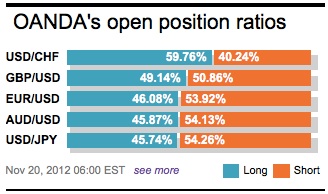So far, it looks like most investors have shrugged off first-hand France losing its coveted triple A credit rating late Tuesday. Global equities have weakened only modestly or if at all. Throughout the overnight session, the EUR has managed to recover most of its initial losses. Even the French government bonds were little changed, as markets wait for any tidbits from the scheduled Euro-zone finance ministers meeting later today.
Moody’s downgraded France’s rating by one notch to Aa1 from Aaa, bringing its rating in line with that of S&P. The rating agency used the regular plethora of excuses, citing the ongoing weakness in the French economy, risks to the government’s finances posed by the country’s persistent structural and economic challenges and its exposure to troubled euro-zone members. That last reason could easily be number one and the only reason.
Market focus centers on the Euro-group meeting and the potential agreement of disbursement of the next tranche of aid to Greece. There is swirling chatter amongst the news sources that the euro zone finance ministers will give a tentative go-ahead for the disbursement of +€44b in emergency loans to Greece today. However, said monies will only be disbursed on December 5 if Greece meets all remaining conditions. Once endorsed, proposals on how to cut Greek debt and provide additional financing can be sent back to each member assembly for approval, a step that could be completed by month-end.
International creditors are said to be examining the possibility of Greece extending repayments by ten years, as well as accelerating the release of emergency funds to finance a debt buyback. Amongst the numerous proposals put forward, is a cut of interest payments on the initial +EUR53b loan lent by other Euro group members in 2010. The aching question for most investors is whether the Euro-zone finance ministers will ever reach a long-standing compromise to achieve Greek debt sustainability? Historically, it takes many revision of the same question before self-interested member states can agree on a compromise!
The ECB was not the only CBank making the airwaves in the overnight session. Both the RBA and BoJ were out in full force, with the former providing its previous minutes and the latter with further rate decisions. Governor Stevens and his policy makers are clearly more dovish and echoed this theme in their ‘statement.’ The usual highlights were called out, noting slightly higher-than-expected September quarter inflation, more positive news out of China and the US, but risks to the Eurozone. One adjusted sentence in the minutes final paragraph, “members considered that further easing might be appropriate in the period ahead,” has left the door ajar for further monetary easing. There was no surprise to see that the BoJ has left its AP program and its overnight target rate unchanged last night. That was very much the consensus call. Governor Shirakawa reiterated that his policy makers will continue to pursue seamless monetary easing and will monitor the impact of the JPY on the economy.
Tilting away from CBanks and focusing on reserve currencies, apparently the IMF is considering using the twin commodity currencies of CAD and AUD in its list of reserve currency pairs. So far, the market perception believes that the rather vocal organization may be a bit late to the reserve party game as this is not original news.
Both the Reserve Bank of Russia and SNB have already declared and allotted room for both currencies over the past 18-months. At most, the declaration will only further enhance the loonies’ profile in the institutional space.
Many do not believe that both these currencies fit the global criteria for reserve currency status. The size of either country’s GDP is not significant enough. These currencies are not being used on a wider global transactional scale or for constant global debt issues. This should, in itself, speak volumes.
Stateside this morning, data is rather limiting in this holiday-shortened week. The market should keep an ‘ear out’ for Fed Chair Bernanke’s address at the Economic Club of NY, on the topic of “The Economic Recovery and Economic Policy.” Some tidbits might point us to ponder QE3 and its role next year. On the other hand, its three weeks to the next Fed meeting and Uncle Ben rarely ever gives his hand away.

The EUR remains in a tight range and with a US holiday shortened week, liquidity will end up being the markets number one concern. It seems that current sentiment wants to stick with the bull bias but keep their targets and stop levels tight and realistic. Despite the market prices being off yesterday’s highs, investors will look forward to buying dips back to the 10-DMA (1.2747-55). Analysts note that intraday studies remain bullish, but are close to overbought territory. This EUR market needs to penetrate the upper price level of 1.2830-40 soon to justify owning any long positions.

Other Links:
Single Currency eyes Eurogroup for Support
This article is for general information purposes only. It is not investment advice or a solution to buy or sell securities. Opinions are the authors; not necessarily that of OANDA Corporation or any of its affiliates, subsidiaries, officers or directors. Leveraged trading is high risk and not suitable for all. You could lose all of your deposited funds.



